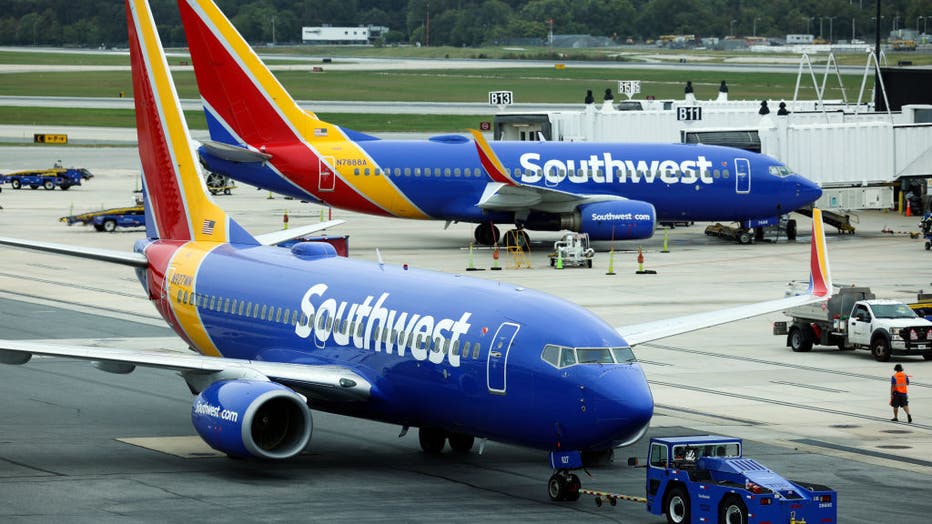Southwest Airlines announces 2 major changes: What to know

Southwest Airlines announces open seating, baggage fee changes
Southwest Airlines announced significant changes to its seating and baggage offerings ahead of 2025. (Credit FOX 4 News)
As holiday travel picks up steam, some airlines have announced sweeping changes to customs that passengers had once taken for granted.
Travel in the U.S. on the Sunday after Thanksgiving broke a record this year, the Transportation and Security Administration said. The TSA said it screened nearly 3.1 million people at security checkpoints nationwide on Dec. 1, setting a new record.
It’s the most people screened in a single day in TSA’s 23-year history, the agency said, and is only one of two days to ever top 3 million passengers.
As we continue into the holiday travel season, here are some changes you need to know:
Southwest Airlines: Seating assignments change
Southwest announced this year another major change to its operations.
Southwest has been known for its open boarding policy for more than half a century, and later in 2025, the airline will begin selling assigned seats.
The assigned seats will become available on flights in early 2026.
RELATED: Southwest open seating, baggage fee decisions announced
Citing a Southwest survey, the Associated Press reported this fall that 80% of the airline’s customers want to know their seat before arriving at the airport instead of having to search for open seating when they board the plane. Southwest will now have four airfare tiers to accommodate passengers.

'Travel Tuesday' officially underway across U.S
With many Americans expected to travel for the holidays, 'Travel Tuesday' is an opportunity for travelers to take advantage of flight sales. LiveNOW from FOX host Josh Breslow spoke to Haley Berg, Lead Economist at Hopper on the latest.
Southwest Airlines: Cabin service change
Southwest is also making a change to its cabin service.
Beginning Dec. 4, a company spokesperson said cabin service will begin ending earlier on flights.
This means passengers will need to do the usual pre-landing procedures earlier than before. Pre-landing procedures can include fastening seatbelts and returning seats to an upright position.
RELATED: Southwest making a change to cabin service
Flight attendants will now begin preparing for landing at an altitude of 18,000 feet instead of 10,000 feet.
The change in procedure is designed to "reduce the risk of in-flight turbulence injuries" for crew members and passengers, the company said.
While turbulence-related fatalities are quite rare, injuries do happen.
American Airlines: ‘Gate lice’ crackdown
American Airlines is testing new technology to end a process known as "gate lice," which is when passengers cut lines in hopes of boarding a flight early.
The system audibly flags when a passenger attempts to board the plane before their designated assignment is called.

A Southwest Airlines airplane taxies from a gate at Baltimore Washington International Thurgood Marshall Airport on October 11, 2021 in Baltimore, Maryland. (Photo by Kevin Dietsch/Getty Images)
RELATED: What is 'gate lice'? American Airlines cracks down on viral travel phenomenon
American Airlines is in the early phases of testing the process, piloting the technology at Albuquerque International Sunport, Tucson International Airport and Ronald Reagan Washington National Airport.
The slang term "gate lice" has gained traction on social media in recent years. Though it's not known who invented the phrase, several travel blogs and Reddit forums discuss "gate lice" at length.
Playing ''check-in chicken' at airports
A travel hack has taken over the internet with social media users discussing this risky trick.
"Check-in chicken" consists of flyers waiting until check-in is almost closed until booking a seat.
The gamble is that left-over seats that are more desirable, such as extra legroom or an exit row, will be assigned.
Adam Duckworth, president and founder of the Florida-based agency Travelmation, told Fox News Digital, "Being a ‘check-in chicken’ will 100% add stress to your day."
"To do this properly, you have to regularly monitor seat maps in the last 24 hours before going on a trip. For many of us, the time is better spent packing and getting everything in order around the house before our travels," said Duckworth.
So far, no airlines have come out with a policy to prevent travelers from going along with the latest trend.

